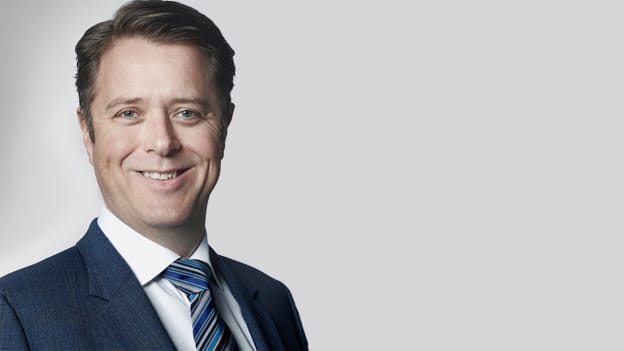True hybrid working offers the best of both worlds: Jaguar Land Rover’s Dave Williams

READ the August 2021 issue of our magazine: The Rise of Work Tech
Dave Williams was appointed as Jaguar Land Rover’s Executive Director of Human Resources in July 2020. He joined the company as Head of Employee Relations at Solihull Manufacturing Operations in 2007, before taking on the role of HR Director of Global Marketing, Sales and Service. As HR Director, Operations, Dave was integral to the Organization Development in China underpinning huge growth and led the transformation of the HR Operating Model. More recently, he was responsible for the people workstream of the company’s Charge transformation program which created a leaner and more resilient organization.
Before Jaguar Land Rover, Dave started his HR career with Ford in 1998, working in various roles across HR including British and European Marketing and Sales Organizations, UK Parts, and Service Operations and Manufacturing.
Dave has a Masters in Personnel Management from University of the West of England and a BA in Business Admin from Middlesex University. He is also Chair of Governors at the Warwick Manufacturing Groups’ Solihull Academy for Young Engineers, a Parent Governor at his children’s primary school, a Governing Board Member for Evanta, a professional training and coaching network, and is an Advisory Board Member for The Partnering Partnership - a dedicated network for HR Business Partners.
Here are the excerpts.
How do you see the current world of work landscape with offices reopening in several countries while new strains of Coronavirus wreaking havoc in other countries?
Clearly, the safety and well-being of our employees across the world comes first. We have taken a cautious yet practical approach throughout the pandemic to ensure that we can adapt to the ever-changing situation and continue to provide a work environment that our colleagues feel safe in, wherever they are located. The situation continues to change rapidly around the world and different countries are facing different challenges and timelines. We’re continuing to monitor and adapt to the situation as it evolves and working closely with our global HR colleagues to provide the right guidance and support, tailored to local circumstances.
What’s your take on the ‘hybrid’ workplaces which a lot of organizations globally are embracing? Is ‘hybrid mode’ the future of work?
Whilst it’s been great seeing our colleagues returning to Jaguar Land Rover sites as local lockdown restrictions began to ease, the pandemic has created the opportunity for our employees to create new work routines, working both from the office and from home, where roles allow.
MORE FOR YOU...
- Roman Matla, Google on building inclusive culture
- Donald Sull of MIT: Culture will remain crucial to corporate success
- Alan May, HPE’s EVP-HR on the new ways of working
We are adopting hybrid working because our employees told us this is how they prefer to work following the pandemic. We believe it supports well-being and inclusivity; we’re confident it will improve engagement and also reduce employee travel, supporting our sustainability targets. I believe hybrid working will provide us with more choice and flexibility around how, when, and where we work, to enable a balance that suits our individual needs, the needs within teams, and the wider needs of the business. For the roles where it is appropriate, hybrid working enables our people to make responsible choices about where they work in collaboration with their team-mates – office or remote - and also to choose what their schedule looks like within their working day.
During the lockdown, I was fortunate to be able to trial working flexibly and have a good home set up in a ‘posh shed’ in my garden! But even with a great setup, at times it did feel isolated, and I definitely missed the opportunity to collaborate more fully on more challenging topics - so I think true hybrid working offers the best of both worlds.
Successful implementation of hybrid working will depend on a collaborative approach, and honest conversations between colleagues, managers, and wider teams, to establish the ways of working which best ensure the delivery of business outcomes, whilst also supporting team preferences.
I’m confident that adopting hybrid working will support Jaguar Land Rover culturally; fueling innovation, agility, and value creation to truly transform our business and help us realize our global Reimagine strategy.
Do you see a synergy in terms of how the best companies are leading their teams to come out stronger on the other side of the pandemic?
I think a lot of companies have taken the opportunity to reflect on how they can change their ways of working to both help employee well-being but also suit the needs of the business. At Jaguar Land Rover, we wanted to really engage with our employees to get their perspective on what the new world of work could look like. We used feedback from employee surveys and colleague workshops to help inform our approach on new ways of working, coming out of the pandemic. The critical learning for me is the need to think about the "purpose" of where and how we work – so the experience of being in the office is meaningful, using the opportunity to interact as a team, and not just spending the day conducting virtual meetings from a different location.
During the pandemic, we’ve learned a lot about effective remote working but we need to remember the importance of "in-person" interaction for strong relationships, collaboration, learning, and our well-being - all humans need human interaction! For me, finding the right balance is key – doing the right activities in the right place, with the right people, to make the office experience meaningful.
Of course, many of our people have worked on-site throughout the pandemic, such as our Manufacturing colleagues, or have roles that require coming into the office more often, so in many cases, the hybrid working model is less applicable and we need to also manage for that. Workplaces are evolving and at Jaguar Land Rover we are working to find a balanced approach for all our people, supporting them whether they are working remotely or on-site.
What are some of the areas successful companies are focusing on most amid this uncertainty?
From a business strategy perspective, I think the uncertainty created by the pandemic has led to many companies critically evaluating their activities - assessing what is truly value add - and prioritizing resources accordingly. In our case, we have fully reevaluated our strategy. In February 2021, Jaguar Land Rover launched its new global strategy, Reimagine, a plan which will see us transition to being an electric-first business. We also want to achieve net-zero carbon emissions across our supply chain, products, and operations by 2039. Reimagine enables us to prioritize our activities so that we know exactly what we need to do to achieve our strategic vision - to create a new benchmark in environmental, societal, and community impact for a modern luxury business.
We have put into action a transformation plan, named Refocus, to drive the first essential priorities on this journey. From a people perspective, we are working to install true organizational agility, starting in our engineering teams where literally thousands of people will move to agile ways of working this year. This includes new business behaviors that will underpin the levels of empowerment required to make agile successful, and finally a range of workplace initiatives that support this - including the hybrid working model we have developed.
Almost all businesses are forced to reimagine how they work, experiment with new things, and most importantly get broken things right. What traits will distinguish highly successful companies in the transition to the post-pandemic workplace?
I think businesses that are open and willing to adapt to changes, post-pandemic, will be the most successful. The pandemic has provided us with an opportunity to really look at what is working – as well as what isn’t - and instill long-term changes to both our strategy and our organization which will protect our sustainable future. As I mentioned, agile working is a practice that we’re embracing at Jaguar Land Rover with the principles of team-working, moving at pace, and fast failing being traits which we believe will enable our business to continue to flourish.
Another area where this is embodied is in our InDigital program – a driving force to transform our business, powered by data and technology. The program delivers real impact at a global scale, taking an agile approach to delivering digital transformation and helping the business fulfill our Reimagine strategy.
Reimagine has provided us with a roadmap that provides a clear direction for the business and our two brands. We will become a more agile business, with a simplified manufacturing operation and organization structure. Alongside this, to help us succeed, collaboration is key. Facilitating closer collaboration and knowledge-sharing with our fellow Tata Group companies will enhance sustainability and reduce emissions, as well as enable us to share best practices in next-generation technology, data, and software development leadership.
Finally, we are seeing an increased global focus on sustainability, with environmental, social, and governance (ESG) metrics helping businesses to ensure long-term resilience, value creation, and competitive advantage. At Jaguar Land Rover, this is embodied in our Reimagine strategy which places true sustainability at the center of everything we do - from design to engineering, from supply chain to manufacturing processes.
HR has arguably never been so critical and has never been more visible. We’ve been hearing a lot about the shifting role of talent leaders since the start of the pandemic. What’s your view of the HR landscape today and how is this going to evolve in the next 2 years?
Jaguar Land Rover is going through a rapid transformation to an electric-first business as part of our Reimagine strategy. We’re facing changes from a strategic perspective and also from the changes we’re seeing as we emerge from the pandemic i.e. hybrid working. HR has, and will always, play a vital role in developing, reinforcing, and changing the culture of an organization.
HR has a leadership role in transforming the business – the significant changes implied by shifting the organization to agile ways of working, the instilling of the behavior set required to underpin empowerment, ensuring we are developing and attracting the next generation of digital leaders and that we are building and developing the critical capabilities to succeed. As previously mentioned, data and technology, as well as software and electrification, are key areas for us, so not only do we need to make sure we attract the best future talent to join us, we also need to balance this with reskilling, training and developing our existing employee base to support them through our transformation.
What is the most significant thing that came out during this pandemic about leadership according to you?
Throughout the pandemic, and as we have implemented our Reimagine strategy, I have sought to communicate with our workforce in as open and transparent a manner as possible. That includes, sometimes, saying that I don’t have all the answers but seeking to engage in an adult dialogue about where we are, to build trust and two-way communication. At a time of great change and uncertainty, I have found this to be really helpful in terms of engagement.
For the post-pandemic world, do you think the archetype of a successful leader will have to be reimagined?
I think some of the themes that have emerged from the pandemic suggest that successful leaders will place more focus on diversity and inclusion, employee well-being, company purpose, and the growing role of technology in the workplace.
But probably, most important is the concept of "servant leadership". The world we live in now is so ambiguous – working in that environment must finally kill off the concept that leaders "have the answers". Leaders have a role to play in terms of setting the strategic direction but, after that, the role is to coach and empower their teams to solve the challenges being faced.
The pandemic exposed the current state of affairs when it comes to diversity, equity, and inclusivity while offering us an opportunity to fix broken links. What should be the way for businesses to leverage this moment and fix the gaps?
Given the challenges of the last 18 months, it is more important than ever that we all work together to ensure everyone within our business feels included, safe, and respected at all times.
At Jaguar Land Rover, we encourage all colleagues to actively and positively talk about diversity and inclusion, to be curious, to have an open mindset, to welcome diverse thinking, feedback and challenge. Our senior teams are undertaking diversity and inclusion immersion sessions, to equip our leaders with the knowledge and understanding that will enable them to reflect on how they will personally act as role models and champions. We are immensely grateful to our employee-led Diversity & Inclusion Networks for their support and commitment to creating positive cultural change.
Nevertheless, as a global, multicultural organization, we know our work in this space has just begun. We are on a continual journey of improvement in order to foster a culture that is representative of our global customers and the societies in which we live; a culture in which every one of our employees can bring their "authentic self" to work and reach their full potential. The job of the Executive team and every leader and manager is to create an environment that enables this. The role of every employee is to actively contribute toward this.
How do you see the larger HR tech and work tech scenario today? Can you give us an overview of how JLR is embracing HR and work tech such as people analytics?
This will be absolutely fundamental – we are building the HR Data and Technology team and putting it at the heart of the function. The vision is to enable "next-generation shared service"; an end-to-end connected digital experience for employees, where they can interact with all the core service propositions on their terms - and in their time. This will enable us to refocus what we do and turn the shared service proposition into a data and technology-led proactive capability that drives everything we do in HR – it will be the engine room for the function.
One important lesson (personal/professional) that you have learned from this pandemic?
The overwhelming emotion I feel as I look back over the last 18 months is pride. Despite the most incredible challenges, the Jaguar Land Rover team has pulled together and continues to pull us through, delivering outcomes we would not have thought possible at the start of the pandemic.
Little could we ever have imagined, when we first implemented our COVID-19 safe working protocols, that we would still be working under many of these constraints over 18 months later. I know it’s been a tremendously challenging time for everyone. Whether working from home or working on-site, we've all had to deal with huge amounts of change and uncertainty, as we’ve never experienced before. Many of us have also had to deal with the enormous, and painful, loss of friends and loved ones. My heart goes out to all those affected.
Working during the pandemic has, at times, stretched us all to our limits. I could not be prouder of our global Jaguar Land Rover family for all they have done, and continue to do, to keep our business operating successfully under the most challenging of circumstances.














